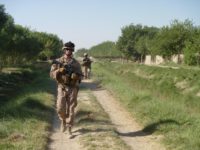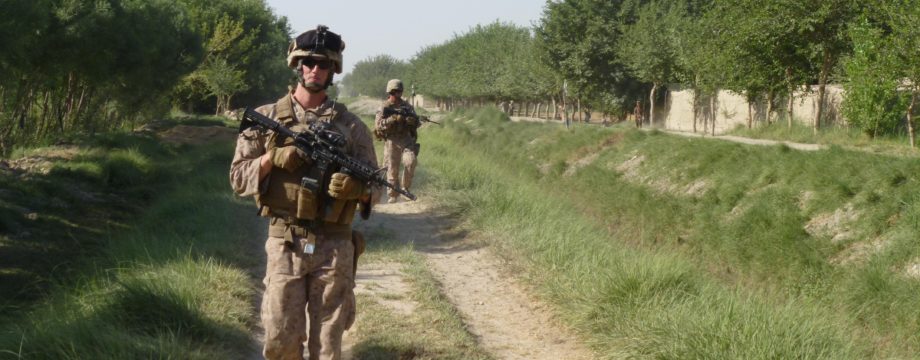 During a pre-election patrol, elements of Kilo Company 1st Platoon were engaged by Taliban fighters. One Marine, 1st Lieutenant Scott Fleming, was killed in action.
During a pre-election patrol, elements of Kilo Company 1st Platoon were engaged by Taliban fighters. One Marine, 1st Lieutenant Scott Fleming, was killed in action.
Contents
News
Search for Marine lieutenant’s killer meets Afghan obstacles
Sara Carter || 10 October 2010
HELMAND, AFGHANISTAN — Jason Armas, a U.S. Marine Corps captain, scrolled through the photographs of four bearded Afghan men believed to be responsible for the assassination of Marine 1st Lt. Scott J. Fleming.
A few days earlier, on the eve of Afghanistan’s parliamentary elections, Taliban insurgents shot the 24 year-old Marietta, Ga., man through the neck, killing him instantly. Fleming’s comrades from the 3rd Battalion, 3rd Marine Regiment were intent on capturing the Taliban who had killed the young platoon leader.
“The goal is to pin the enemy up against the [Helmand] river and fix and finish them,” said Armas, before heading out on a combined patrol with Marines and Afghan National Army soldiers to hunt the killers. “These guys are responsible for Lt. Fleming’s death and we want them.”
But Armas knew the mission was likely to end in frustration. And he knew that even if suspected Taliban killers were captured, it was all too probable that they would swiftly be released.
Troops here have nicknamed the local court system “Taliban catch and release.” They say it has emboldened the Taliban. It certainly has angered NATO troops who make enormous sacrifices tracking enemy fighters only to watch them walk out of detainment.
American and Afghan military officials who spoke with The Washington Examiner say the Afghan judicial system puts an unrealistic burden of proof on U.S. troops tracking and capturing enemy in the region.
Further, the Afghan court lacks understanding of scientific technical evidence such as fingerprints, DNA and a host of evidence-gathering techniques used by troops. Instead, the Afghan system relies more on physical evidence found on the detainee and statements written in native language from Afghan eyewitnesses.
When evidence against insurgents is acquired through classified means, those procedures are not shared with the Afghan courts. That often leads to cases being dismissed.
“It’s as if the Taliban have more rights than us or the people of Afghanistan,” said Specialist Charles Brooks, 26, a U.S. Army medic with 1st Battalion, 4th Infantry Regiment, in Zabul province.
“We have to let these guys go all the time no matter what they do, and then we find them trying to hit us again. But if they think I’ve screwed up once, then they’ll [the military] have no problem throwing me to the wolves,” Brooks said.
It is a sentiment shared by dozens of American troops interviewed during a monthlong tour of southern Afghanistan.
It isn’t just U.S. troops who are frustrated. Afghan military officials also complain that their own system and NATO’s judicial processes work against the goals they are trying to achieve. It has become apparent that villagers in the Helmand region are not delivering information about the enemy as they once did.
“In the past, the villagers were able to assist us with information about the Taliban, but that has changed,” said Afghan Commander Gul Ahmed, who heads the Afghan National Army battalion at Combat Outpost Geronimo, in Nawa, a combined element with the Marine division in Helmand.
He said the Taliban “know they won’t be held for long and use it to their advantage.
“If the [people] report something on someone, giving evidence of Taliban, for example, with IED equipment, once they are released the Taliban will find out who reported them and have them killed,” the Afghan commander added.
Although many Afghanis are anti-Taliban, he said, “they don’t want to risk their lives or their families if no one is going to back them in the end.”
Armas’ men know that to be the case. The 50-man detachment — half Marines, half Afghan soldiers — patrolled corn and marijuana fields through one long day without seeing a sign of Fleming’s killers.
The patrol spent the night at the abandoned mud compound of Mohammed Khan, one of the suspected killers. Armas stopped an elderly man his hunters encountered along a dirt road to interrogate him about Khan and the other suspects.
“You come here during the day sometimes. The Taliban come every night. You tell me this, how long will you stay? Why should I trust you?” he said to Armas.
“I can’t blame the old man for feeling the way he does,” Armas admitted.
The two-day patrol produced little of substance to bring the Marines closer to the men they are certain killed Fleming. Their efforts will continue despite the obstacles and frustrations, Armas vowed. “It’s difficult for all of us,” he said. “The only thing that’s certain is that Lt. Fleming’s killers are still out there.”
Copyright © The Washington Examiner 2010
Awards
Bronze Star Medal with Combat Distinguishing Device
Jorge Diaz
 For heroic achievement in connection with combat operations against the enemy while serving as Squad Leader, Company K, 3d Battalion, 3d Marines, Regimental Combat Team 1, 1st Marine Division (Forward), I Marine Expeditionary Force (Forward) Afghanistan, on 17 September 2010 in support of Operation ENDURING FREEDOM. While conducting combat operations, an unknown number of insurgents attacked Sergeant Diaz and his squad with rifles, medium machine guns, and grenades from three positions. Without hesitation, he left cover, exited the compound and engaged the enemy. Selflessly exposing himself to fire, he pulled a wounded Marine to cover. Realizing that a radio had been dropped outside the compound, he again left cover to retrieve the radio and initiated a contact report. Still under heavy enemy fire, he began directing his squad’s actions. To regain the initiative, he established a hasty skirmish line and oriented effective fire on the enemy, preventing two enemy combatants from flanking the squad’s position and closing to hand grenade range. Although wounded in his left arm, Sergeant Diaz was able to transmit casualty reports and evacuation requests. As his Marines gained and maintained fire superiority, the enemy extracted with two wounded, leaving one dead. His tenacity repelled a complex attack and forced the enemy to withdraw. His actions resulted in the evacuation of all Marine casualties and undoubtedly saved additional lives. Sergeant Diaz demonstrated to the enemy how fierce a Marine squad can be as he led his men that day. By his extraordinary guidance, zealous initiative, and total dedication to duty, Sergeant Diaz reflected great credit upon himself and upheld the highest traditions of the Marine Corps and the United States Naval Service.
For heroic achievement in connection with combat operations against the enemy while serving as Squad Leader, Company K, 3d Battalion, 3d Marines, Regimental Combat Team 1, 1st Marine Division (Forward), I Marine Expeditionary Force (Forward) Afghanistan, on 17 September 2010 in support of Operation ENDURING FREEDOM. While conducting combat operations, an unknown number of insurgents attacked Sergeant Diaz and his squad with rifles, medium machine guns, and grenades from three positions. Without hesitation, he left cover, exited the compound and engaged the enemy. Selflessly exposing himself to fire, he pulled a wounded Marine to cover. Realizing that a radio had been dropped outside the compound, he again left cover to retrieve the radio and initiated a contact report. Still under heavy enemy fire, he began directing his squad’s actions. To regain the initiative, he established a hasty skirmish line and oriented effective fire on the enemy, preventing two enemy combatants from flanking the squad’s position and closing to hand grenade range. Although wounded in his left arm, Sergeant Diaz was able to transmit casualty reports and evacuation requests. As his Marines gained and maintained fire superiority, the enemy extracted with two wounded, leaving one dead. His tenacity repelled a complex attack and forced the enemy to withdraw. His actions resulted in the evacuation of all Marine casualties and undoubtedly saved additional lives. Sergeant Diaz demonstrated to the enemy how fierce a Marine squad can be as he led his men that day. By his extraordinary guidance, zealous initiative, and total dedication to duty, Sergeant Diaz reflected great credit upon himself and upheld the highest traditions of the Marine Corps and the United States Naval Service.
